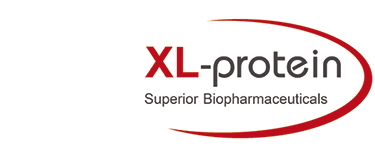XL-protein and DNX Biopharmaceuticals Announce Collaboration to Develop Novel Inflammasome-Directed Therapeutics using PASylation® Technology
Freising, Germany and San Diego, CA, February 25, 2020 — XL-protein has extended its existing partnership with DNX Biopharmaceuticals, a biopharmaceutical company developing nonimmunogenic, long-acting therapeutic proteins for the treatment of patients with life-long diseases, to develop novel inflammasome-directed therapeutics for the treatment of diseases linked to inflammation, autoinflammation and oncology. DNX has exercised an option for an exclusive license to research, develop and commercialize a novel antagonist from within the DNX portfolio, modified by XL-protein’s PASylation® technology. Financial terms of the collaboration were not disclosed.
The Inflammasome is involved in the initiation and regulation of innate and acquired immunity, sterile inflammation, tissue remodeling, cell death, hypoxia-ischemia and organ failure. Dysfunctional signaling related to the inflammasome complex leads to smoldering or chronic inflammation, which is implicated in a wide range of pathological conditions, including cancer, heart disease, several systemic autoinflammatory conditions such as cryopyrin-associated periodic syndromes (CAPS), type II diabetes, rheumatoid arthritis (RA) and gout.
“We are pleased that DNX has chosen PASylation® technology for the design of biopharmaceuticals with extended plasma half-life and enhanced action,” comments Claus Schalper, CEO of XL-protein, adding that “DNX’s deal with Johnson & Johnson provides another validation of our proprietary platform.”
“We are delighted to be collaborating with XL-protein and the use of their PASylation® technology to progressing DNX’s novel receptor antagonists into clinical development,” said Rajiv Datar, Co-Founder and CEO of DNX.
About PASylation® Technology
‘PASylation’ involves the genetic fusion or chemical conjugation of a therapeutic protein or pharmaceutically active compound with a conformationally disordered polypeptide of defined sequence comprising the small natural amino acids Pro, Ala, and/or Ser. Due to the biophysical size effect, the typically rapid clearance via renal filtration of the original drug can be retarded by a factor 10-100, depending on the length of the PAS chain. PAS sequences are highly soluble while lacking charges, they are biochemically inert, non-toxic and non-immunogenic, they offer efficient recombinant protein production in a variety of biotechnological host organisms, and they show high stability in blood plasma but are biodegradable by intracellular proteases.
About XL-protein GmbH
XL-protein is a German biotech company commercializing its ground-breaking PASylation® technology, which enables the design of biopharmaceuticals with extended plasma half-life and enhanced action. Based on a strong proprietary technology position, XL-protein focuses at the preclinical as well as clinical development of PASylated proteins in diverse disease areas. XLprotein is engaged in a growing number of partnerships with international pharmaceutical and biotech companies at various levels.
For more information, please visit: www.xl-protein.com
About DNX Biopharmaceuticals, Inc.
DNX is a biopharmaceutical company developing long-acting therapeutic proteins for the treatment of patients with life-long diseases. Founded in 2014 and headquartered in San Diego, CA, USA, DNX is pursuing the development of new therapeutic proteins designed to target pathways in the autoinflammation-inflammation spectrum aiming to block key mediators of immunity and inflammation for treating diseases and disorders. DNX is a resident of Johnson and Johnson Innovation – JLABS, Shanghai, a JLABS QuickFire Challenge (QFC) winner and has just closed a deal with the Lung Cancer Initiative at Johnson and Johnson.
For more information, please visit: www.dnxbio.com
Download full press release
